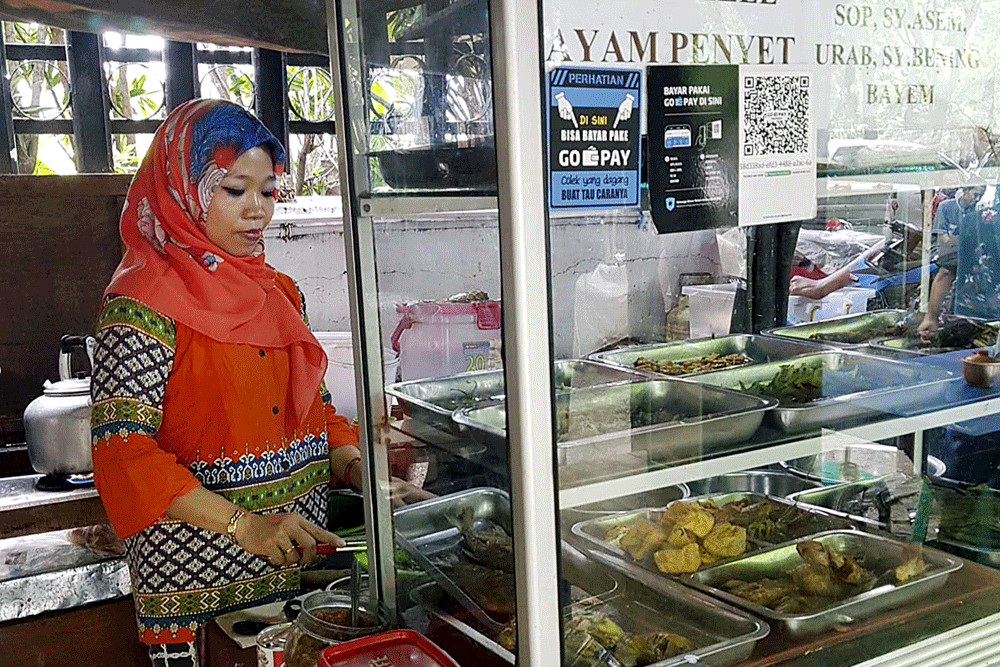Popular Reads
Top Results
Can't find what you're looking for?
View all search resultsPopular Reads
Top Results
Can't find what you're looking for?
View all search resultsThousands of Jakartans pushed to brink of homelessness by COVID-19 pandemic: NGOs
The economic impacts of the COVID-19 pandemic have hit Jakartans hard, with many struggling to pay their rent and facing threats from online loan sharks, several NGOs have reported.
Change text size
Gift Premium Articles
to Anyone
 Sutariyah, a 36-year-old food seller, prepares meals for customers in her food stall located in front of Al-Azhar University in Kebayoran Baru, South Jakarta, on Jan. 4, 2019. Thousands of people in Jakarta are at risk of becoming homeless after losing their livelihoods because of the economic impacts of the COVID-19 pandemic, several NGOs have reported. (-/-)
Sutariyah, a 36-year-old food seller, prepares meals for customers in her food stall located in front of Al-Azhar University in Kebayoran Baru, South Jakarta, on Jan. 4, 2019. Thousands of people in Jakarta are at risk of becoming homeless after losing their livelihoods because of the economic impacts of the COVID-19 pandemic, several NGOs have reported. (-/-)
T
housands of people in Jakarta are at risk of becoming homeless after losing their livelihoods because of the economic impacts of the COVID-19 pandemic, several NGOs have reported.
"Between April 20 and 24, we received 71 complaints from Jakartans saying they are struggling to pay their rent," Rujak Center for Urban Studies executive director Elisa Sutanudjaja said in a teleconference on Wednesday.
The complaints, she said, ranged from sellers to college students, housewives, construction workers, taxi drivers, app-based ride-hailing drivers and app-based massage therapists.
Thousands of other Jakarta residents are also at risk of losing their homes.
"Thirty five percent of Jakarta residents live in rented homes," she said.
A recent survey conducted by the Amrta Institute, Lokataru Foundation, Indonesian Legal Aid Foundation (YLBHI), Jakarta Legal Aid Institute (LBH Jakarta) and Rujak Center for Urban Studies found that around 27 percent of Jakartans were now struggling to pay their rent.
Budiarso, a resident from Pademangan Barat, North Jakarta is one of these people.
"I've fallen behind on my rent for more than a month. I've talked to my landlord but I don't know how long he can give me leniency," Budi said in the teleconference.
Budi, who used to worker as a hawker in Ancol, said he lost his livelihood after the Jakarta administration temporarily closed tourist destinations in the city to curb the spread of the virus.
"I've tried to earn money in other ways but I’ve only made enough to feed my wife and three children; it isn’t enough to pay our Rp 1 million rent each month," he said.
Elisa said the government should provide a safety net to ensure residents who rented homes would not become homeless.
"The government should provide a mechanism to give renters leniency or provide rental relief," she said.
The government could also cooperate with NGOs to list residents who have become homeless.
"The government could provide temporary housing for residents who have been evicted from their rental homes by utilizing sport halls, schools, mosques or vocational training centers," she said.
LBH Jakarta director Arif Maulana said the economic impacts of the COVID-19 pandemic had also put people who borrowed money from online lenders at risk of intimidation and data breaches.
"In the last two months we have recorded 53 cases related to online lenders. Many residents are struggling to pay their debts because of the pandemic. However, creditors refuse to provide leniency despite the current situation," Arif said on Wednesday.
He said many borrowers experienced online or even physicals threats from creditors after falling behind on their dues.
"Some creditors even leak the borrowers’ data online."
According to Arief, layoffs were the second most common legal issue the institute handled during the pandemic.
"We have received 35 complaints regarding layoffs in the last two months. Apparently many companies have refused to fulfill their obligations when laying off employees.
“Some residents said they were pressured to resign from their jobs so that the company did not have to pay severance pay. Some companies did not pay the employees’ health insurance for months before they were laid off, some purposefully laid off by their employees before Ramadan so they do not have to pay for the Idul Fitri holiday bonuses," he said.









